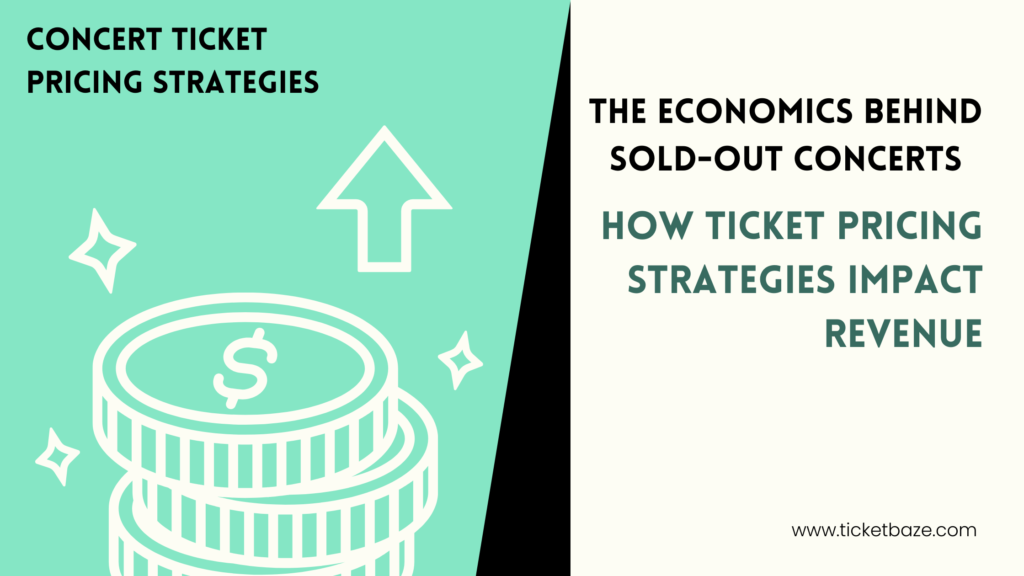Concerts are not just about music; they’re also a significant economic affair. Have you ever marveled at how tickets for some concerts seem to sell out within minutes, while others struggle to fill seats? The answer lies in the intricate world of ticket pricing strategies. In this article, we’ll delve into the economics behind sold-out concerts and explore how ticket pricing strategies play a pivotal role in maximizing revenue.
Understanding Demand
The first step in devising an effective ticket pricing strategy is understanding the demand dynamics. Various factors influence the demand for concert tickets, including the popularity of the artist, the venue’s capacity, and the exclusivity of the event. High-profile artists or bands with a massive fan following can command higher ticket prices due to the sheer demand for their performances. Similarly, intimate venues with limited seating often result in higher demand and subsequently higher prices.
Supply and Demand Dynamics
Successful ticket pricing strategies strike a delicate balance between supply and demand. Concert organizers aim to optimize revenue by adjusting ticket prices based on real-time demand fluctuations. This approach, known as dynamic pricing, allows them to maximize revenue by charging higher prices during peak demand periods while offering discounts during off-peak times.
Dynamic Pricing Strategies
Dynamic pricing involves adjusting ticket prices in response to changes in demand, supply, or other market factors. By leveraging data analytics and algorithms, organizers can set prices dynamically to reflect consumer willingness to pay. For instance, prices may increase as the concert date approaches or decrease if ticket sales are sluggish. Dynamic pricing ensures that tickets are priced optimally to maximize revenue while ensuring maximum attendance.
Price Discrimination Techniques
Price discrimination is another common strategy used in ticket sales. By segmenting the market based on customers’ willingness to pay, organizers can extract higher prices from those willing to pay more while offering discounts to price-sensitive customers. Types of price discrimination include first-degree (individualized pricing), second-degree (quantity discounts), and third-degree (tiered pricing). This technique allows organizers to capture consumer surplus and increase overall revenue.
The Role of Ticketing Platforms
Ticketing platforms play a crucial role in facilitating ticket sales and implementing pricing strategies. Platforms like Ticket Bazes leverage technology to provide a seamless ticketing experience while enabling organizers to implement dynamic pricing and price discrimination strategies effectively. By leveraging data analytics and machine learning algorithms, Ticket Bazes ensures that tickets are priced optimally to maximize revenue while providing value to customers.
Case Studies
Several successful concerts serve as case studies for effective ticket pricing strategies. From Beyoncé’s Formation World Tour to Taylor Swift’s Reputation Stadium Tour, these events employed dynamic pricing and price discrimination techniques to sell out stadiums and arenas worldwide. By strategically pricing tickets based on demand and market conditions, organizers were able to generate record-breaking revenues while ensuring maximum attendance.
Ethical Considerations
While maximizing revenue is essential, organizers must also consider ethical implications in ticket pricing. Fairness and accessibility are paramount, and ticket prices should reflect the value of the experience while remaining accessible to fans of all socioeconomic backgrounds. Concert organizers should strive to strike a balance between profitability and inclusivity to maintain a positive reputation and foster long-term customer loyalty.
The Future of Ticket Pricing
Looking ahead, ticket pricing is poised to undergo further evolution with advancements in technology and consumer behavior. Personalized pricing, dynamic bundling, and subscription-based models are expected to gain prominence, offering consumers more flexibility and value. As the industry continues to evolve, concert organizers must stay agile and innovative in their approach to ticket pricing to remain competitive in an ever-changing landscape.
Conclusion
Ticket pricing is a complex yet integral aspect of the concert industry, with significant implications for revenue generation and fan engagement. By understanding the dynamics of supply and demand, leveraging pricing strategies such as dynamic pricing and price discrimination, and prioritizing ethical considerations, concert organizers can optimize revenue while providing value to fans. As the industry evolves, embracing innovation and consumer-centric pricing models will be key to sustaining growth and success.
FAQs:
- How do concert organizers determine ticket prices? Concert organizers analyze various factors such as artist popularity, venue capacity, and market demand to determine optimal ticket prices.
- Are dynamic pricing strategies fair to consumers? While dynamic pricing may result in higher prices during peak demand periods, it also allows for discounts during off-peak times, providing flexibility and value to consumers.
- What role do ticketing platforms play in ticket pricing? Ticketing platforms like Ticket Bazes facilitate ticket sales and enable organizers to implement dynamic pricing and price discrimination strategies effectively.
- How can organizers ensure fairness in ticket pricing? Organizers can ensure fairness by offering transparent pricing, providing discounts for students or seniors, and implementing measures to prevent scalping and price gouging.
- What does the future hold for ticket pricing? The future of ticket pricing lies in personalized pricing, dynamic bundling, and subscription-based models, offering consumers more flexibility and value in their ticket purchasing experience.
